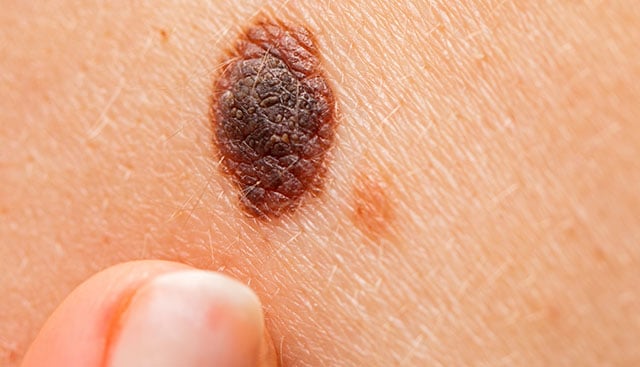Melanoma Signs and Symptoms
Watch: What makes a mole turn cancerous?
What does malignant melanoma look like?
Some melanomas do not involve an asymmetrical, irregular, unusually colored or excessively large mole. Certain types of melanoma can look like a small brown or black streak underneath a toenail or fingernail, while other types can look like an ordinary bruise that doesn’t heal over time. Just as some melanomas do not display any of the traditional warning signs, it’s also possible for some perfectly healthy moles to have an irregular appearance.
Speak to your dermatologist if you notice any of the following changes to your skin:
- A mole that’s suddenly different in appearance
- A small, scaly patch
- Itchy or tender nodules felt under the skin
- A mole that’s uneven in color or has a blurred border
- A bump, sore or rash that does not heal
While the majority of these skin changes aren’t cause for concern, it’s always good to have them looked at by a professional, as early detection is key to an improved outlook for melanoma.
Melanoma on the scalp
Melanoma that grows on the scalp can be a dangerous form of skin cancer, as it’s much harder to detect than melanoma that grows on an unobscured area of the skin. What’s more, this type of skin cancer grows at a much faster rate since there are many more blood vessels and tissues to aid this process. Therefore, it’s beneficial to conduct regular scalp skin checks—even more so if you are bald or have thin hair.
Here’s how to conduct a scalp skin check:
- Stand in a well-lit room with a handheld mirror.
- Part a section of your hair and use the mirror to examine your scalp.
- Look for moles, blemishes and red patches as you inspect your scalp, as these can be indications of melanoma.
- Continue parting your hair and examining your scalp until you have looked over your entire head.
While it’s helpful to have a friend or family member to assist you with the scalp skin check, this is something you can do on your own. If you see anything suspicious, make note of it and report it to your dermatologist right away.

Understanding late-stage melanoma
With late-stage melanoma, patients may begin to experience certain uncomfortable symptoms. These melanoma symptoms include:
- Itching
- Bleeding
- Oozing and/or crusting
- Pain and irritation
Because these symptoms may indicate melanoma, they should be immediately discussed with a dermatologist or oncologist who specializes in skin cancer. Regular dermatologist visits can make it much more likely for abnormal moles to be properly detected and diagnosed. Melanoma screenings, such as those performed at Moffitt Cancer Center and at Moffitt’s mobile community Mole Patrol®, can also improve a patient’s chance of early diagnosis, should an abnormality occur.
What are the symptoms of melanoma that has spread?
Metastatic melanoma is cancer that has spread from the skin to another part of the body. It most often spreads to the lymph nodes, brain, bones, liver or lungs, with patients experiencing symptoms based on where it has spread to:
- Lymph nodes – Swollen or painful lymph nodes or hardened lumps felt under the skin
- Brain – Headaches or seizures
- Bones – Fractures or bone pain
- Liver – Loss of appetite, unexplained weight loss or enlarged liver
- Lungs – Difficulty breathing or a persistent cough
It’s also common to experience fatigue and weakness or numbness in your arms or legs.
Melanoma treatment at Moffitt Cancer Center
Moffitt Cancer Center is known for its Donald A. Adam Comprehensive Melanoma Research Center of Excellence. Ours is one of the leading melanoma programs in the state, employing more than 30 world-renowned physician researchers who lead the way in investigating and developing new treatments for the prevention and cure of melanoma. Because of our physicians’ unparalleled level of expertise, those with symptoms or signs of melanoma can turn to Moffitt with confidence to receive comprehensive treatment and support.
If you have already received a diagnosis, the skin cancer experts at Moffitt can review past labwork, biopsies and scans to offer a second opinion. To request an appointment with our team, simply call 1-888-663-3488 or submit a new patient registration form online. We provide every new patient with rapid access to a cancer expert.
